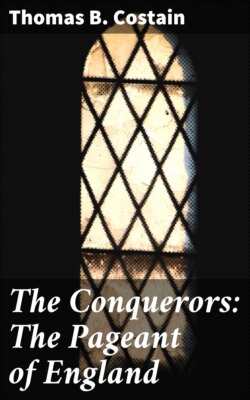Читать книгу The Conquerors: The Pageant of England - Thomas B. Costain - Страница 17
На сайте Литреса книга снята с продажи.
7
ОглавлениеTable of Contents
William died in Normandy, a violent death as was entirely fitting. It was in the summer of 1087 and he had gone to the duchy to set things in order. While there he quarreled with Philip of France over the ownership of the town of Mantes on the Seine. The man who had conquered England was himself in the grip of a conqueror to whom all men, kings and commoners alike, must yield in the end. He had grown so corpulent that people laughed behind his back and whispered jokes at the size of his belly. While the dispute was being waged, with great bitterness on each side, William was confined to his bed in Rouen, and the French monarch was injudicious enough to make a joke at his expense.
“King William has as long a lying-in as a woman behind her curtains,” declared Philip in the full hearing of his court.
When word of it reached William, he rose from his couch, his face contorted with rage. “By the resurrection and the splendor of God!” he declared. “I will go to mass in Philip’s land and bring a rich offering for my churching. I will offer a thousand candles for my fee—flaming brands, each of them—and steel shall glitter over the fire they make!”
His vengeance was not vented on the French King, for that monarch was safely beyond his reach. Whenever the anger of the great Norman was aroused, however, someone had to pay, and more often than not the brunt of his violent rages was borne by persons entirely innocent. When the garrison of a French town he was besieging hung hides over the walls as a reminder of his humble origin, he had the eyes of prisoners torn out and thrown over the fortifications. He had a servant blinded who carried money from Queen Matilda to their rebellious eldest son Robert, but he did not raise his hand against the wife who alone had disobeyed him.
And now it was the whole town of Mantes which was to pay for the French King’s jest. William waited until the time of harvest, when the crops were being gathered and the people of the district were happy over the plenteous yield. Then he struck. His cavalry rode over the fields of grain, setting fire to the crops. His foot soldiers tore up the vines. The orchards were destroyed and even the shade trees were cut down. This accomplished, and his rage against Philip still burning deeply in his passionate soul, William set fire to the town itself. So thorough was the work of demolition carried out that it might have been supposed he was back in poor England and administering a sample of Norman justice to his unhappy subjects.
It was surely an instance of divine justice that the Conqueror, while riding through the conflagration, should sustain a fall when his horse stepped on a burning plank. He was carried out of the blazing ruins and back to a monastery under the walls of Rouen. Here he lingered for six weeks, suffering greatly and becoming weaker with each day. When it was certain he was going to die, the violent man called in two of his sons, William and Henry, and made a verbal will. He left Normandy to Robert, in spite of the eldest son’s mutinous record. Then he looked at William, his favorite, who also was strong and cruel and who was called the Red because of his coloring.
“As for the kingdom of England,” he said, struggling for breath, “I bequeath it to no one, for it was not bequeathed to me. I acquired it by force and at the cost of blood. I leave it in the hands of God—only wishing that my son William, who has been submissive to me in all things, may obtain it if he please God and prosper.”
Thus in his last moments he acknowledged the truth, that he had no right to the throne of England, that it had been a conquest by force of arms, and that all his acts of oppression had been doubly wrong on that account. What could his thoughts have been as he lay there in pain, knowing that soon he must face his Maker and answer for all his violence on earth? Did he give thought to the countless thousands of people who had died because of his passionate will and ambition? Did the weeping of a nation in chains reach his dying ears? Did he see a huddle of frightened monks about Glastonbury altar and Norman archers climbing the pillars to shoot them down? What were his thoughts of Harold, who would have made England a just and able king, lying dead on the field of Hastings with an arrow in his eye?
